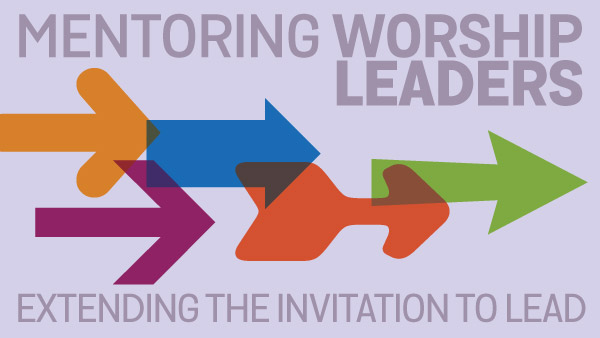
By Kim Gentes (worship leader, songwriter, recording artist and freelance writer)
To some people, that word, mentoring, can sound like a mystical endeavor. We might think of images of sagely monks hidden in mountain top monasteries handing down ancient wisdom, but that vision, however romantic, is not how real mentoring works (unless one intends to be a mountain-dwelling monk). Real mentoring is measured not by its appearance alone, but by its goal and its marked journey toward that goal.
Those points of progress differ for each person and situation. Some people need thorough music training, including instrument, voice, and arrangement skills. Other people need understanding of broader theological and pastoral aspects of how a leader serves the local church in its corporate expressions of worship and ministry. Other people simply need a practical, living example they could watch, listen to, practice with, and eventually work with in a relational opportunity that created space for them to risk, fail, succeed, and learn in a safe environment.
All of this brings us to the point of needing a repeatable plan that can be used, with modifications for each situation, to help the mentoring process. We found that successful mentoring came down to providing an environment in the local church where three essential components exist to support people developing in their calling to worship leadership. Those components are:
- Invitation & Welcome
- Training & Resources (giving people practical tools to develop their skills) and
- Relationship & Opportunity (giving people context, support and opportunities to learn, fail, and succeed).
This blog will focus on the first component.
By Invitation & Welcome, I am referring to the time when someone begins the process toward leading people in worship. Perhaps a pastor or leader directly approached you and asked you to consider leading worship. Maybe, by reading Scripture, you came to the distinct sense that God was calling you as He did Hezekiah, who said, “The Lord will save me, and we will sing with stringed instruments all the days of our lives in the temple of the Lord,” (Isaiah 38:20, NIV).
To create a culture in your community in which people can respond to the unction of the Holy Spirit calling them to lead worship, current leaders and mentors must be purposefully extending a welcome, or an invitation, that echoes these kinds of inspirational moments and says to your people, “Yes, you can be a part of that here, in this local church.” This doesn’t mean that every activity is open for anyone to jump in and start contributing. Depending on the size and vision of your local church this could vary greatly.
An ethos of welcome creates a culture where people feel they can investigate being involved. It can also, possibly, avoid the pitfalls of a culture that feels like “an exclusive club.” Communities that develop the “exclusive club” mentality will constantly be drawing contrasts between the leaders and the followers, the people on the platform and the people in the pews, the “gifted few insiders” and those who are “just regular worshipers.” One of the problems of this kind of culture is that it can lead to a type of venerating of leadership that looks more like American Idol than true servant leadership.
An entire book could be written just on how to recognize and identify potential leaders (and many have), so we won’t cover that here. But once you, as a leader, have identified those people whom you believe God has called you to help mentor, one of the next steps is yours. The style with which you extend that invitation should match the culture of your local church. In some churches, that may be formalized and need clearly outlined specifications and commitments on both sides. In other churches, it might mean just meeting someone at your local coffee shop and starting a conversation about what they believe God is calling them to.
I have found that just taking the steps to initiate an ongoing conversation opens the door where the mentor and the person looking to answer God’s call to developing as a worship leader can begin the journey.
Today, I am still mentoring people, and still learning myself. For me, and many others I have worked with, the concepts of the ethos of welcome and the purposeful invitation were helpful markers to begin the process.
Kim Gentes is at the center of many of today’s most pivotal conversations about worship. As a worship leader, songwriter, recording artist, and freelance writer, Kim has been a featured speaker and worship leader at events across the U.S. and Canada. With his core passion to see worship leaders and teams equipped with the tools they need to do the work of creative ministry, he has been at the forefront of resourcing the global Church in worship for over fifteen years. Kim and his wife, Carol, and their three boys live in the Phoenix, Arizona area. Find out more at KimGentes.com
This blog is excerpted from Mentoring Worship Leaders: Training the Next Generation, compiled and edited by Tom Kraeuter. This collection--along with many other excellent worship leader books, DVD's and consulting materials--are available online at www.training-resources.org.
--For more practical articles on team building for choir directors and worship leaders, go to discoverworship.com










